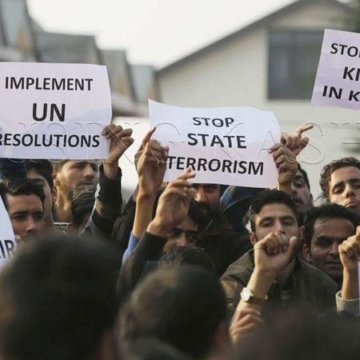- About
- Topics
- Picks
- Audio
- Story
- In-Depth
- Opinion
- News
- Donate
-
Signup for our newsletterOur Editors' Best Picks.Send
Read, Debate: Engage.
The pressing resentment among the Kashmiris was once again overshadowed in exchange of barbs between Pakistan and India after a deadly suicide attack in the troubled valley on Thursday.
In the worst attack recorded in the past three decades – a rare suicide car bombing – at least 44 Indian security forces were killed and many more wounded. Minutes after the attack – claimed by a Pakistan-based militant outfit, Jaish-e-Mohammad – New Delhi adopted a fierce diplomatic stance against Islamabad, and rushed through with measures such as calling back envoy from Pakistan.
The Foreign Office in Pakistan went ahead with its tried-and-test version of linking this massive bombing with the longstanding unrest in the valley, partly controlled by both New Delhi and Islamabad. The FO spokesman, Mohammad Faisal, claimed that "Pakistan has always condemned heightened acts of violence in the Valley. We strongly reject any insinuation by elements in Indian government and media circles that seek to link the attack to the State of Pakistan without investigations."
Now, beyond the bitter exchange of allegations and counter-allegations, some facts are crystal clear: the militant group has claimed the attacks have its bastions and leadership present in Pakistan. This puts an enormous responsibility on Islamabad to pledge cooperation with the investigations, and to eventually bring the perpetrators to justice.
On the part of India, serious soul-searching and revision of policies and attitudes towards the Kashmiris are in desperate need. The Indian leadership must realise it cannot keep such a large population of mainly Muslim minority with discriminatory policies under the shadow of guns.
Kashmir has been burning for decades amid resurgent calls for rights and liberty. In the renewed spate of violence, particularly since 2008, the trend of turning towards armed insurgency, especially among the educated youth, is evidently on the rise. This is clearly a verdict of failure on the engagements of the mainstream Indian and Pakistani political parties, and of course of international institutions that seem unable and unwilling to intervene to stop the bloodshed and broker a lasting peace deal.
ENDS
